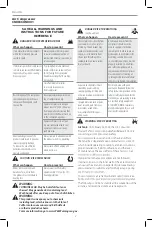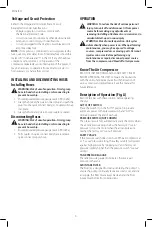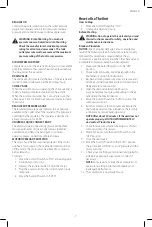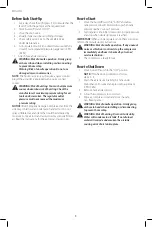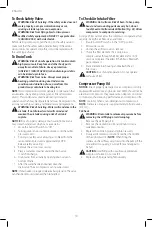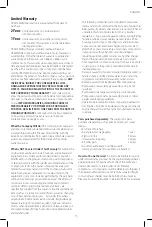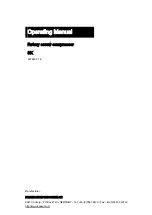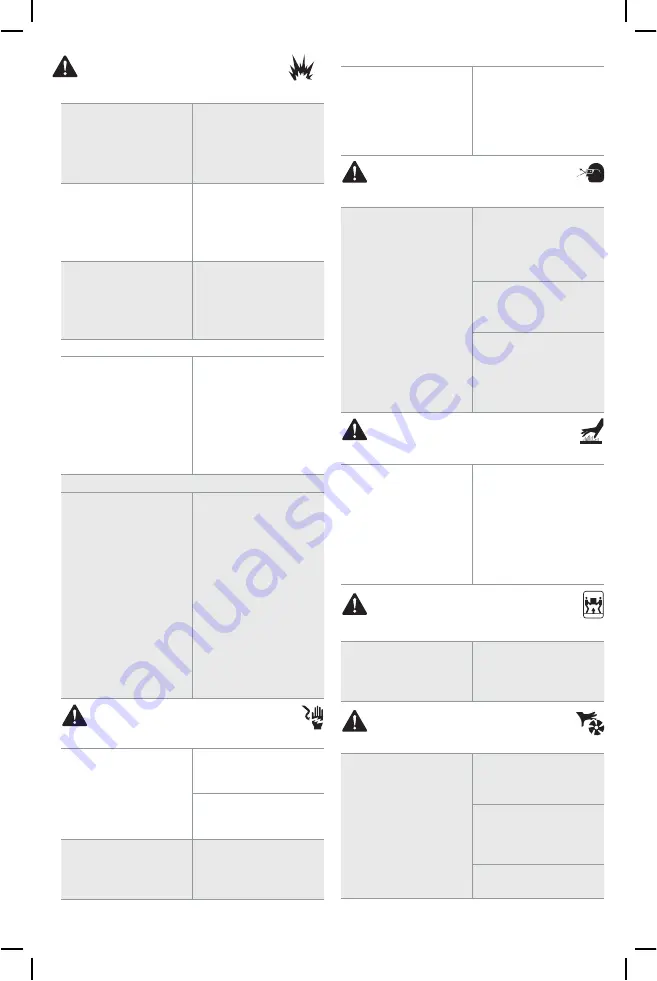
3
ENGLISH
Air Compressor
CMXECXM301
SAVE ALL WARNINGS AND
INSTRUCTIONS FOR FUTURE
REFERENCE
DANGER: RISK OF EXPLOSION OR FIRE
What can happen
How to prevent it
It is normal for electrical contacts
within the motor and pressure
switch to spark.
Always operate the compressor
in a well ventilated area free of
combustible materials, gasoline, or
solvent vapors.
If electrical sparks from compressor
come into contact with flammable
vapors, they may ignite, causing
fire or explosion.
If spraying flammable materials,
locate compressor at least 20 feet
(6.1 m) away from spray area.
An additional length of hose may
be required.
Store flammable materials
in a secure location away
from compressor.
Restricting any of the compressor
ventilation openings will cause
serious overheating and could
cause a fire.
Never place objects against or on
top of compressor pump.
Operate compressor in an open
area at least 12" (30.5 cm) away
from any wall or obstruction that
would restrict the flow of fresh air
to the ventilation openings.
Operate compressor in a clean,
dry well ventilated area. Do not
operate unit indoors or in any
confined area.
Unattended operation of this
product could result in personal
injury or property damage.
To reduce the risk of fire, do
not allow the compressor to
operate unattended.
Always remain in attendance with
the product when it is operating.
Always turn off and unplug unit
when not in use.
CAUTION:
RISK FROM NOISE
What can happen
How to prevent it
Under some conditions and
duration of use, noise from
this product may contribute to
hearing loss.
Always wear certified safety
equipment: ANSI S12.6 (S3.19)
hearing protection.
DANGER: RISK TO BREATHING
(Asphyxiation)
What can happen
How to prevent it
The compressed air directly from
your compressor is not safe for
breathing. The air stream may
contain carbon monoxide, toxic
vapors, or solid particles from
the air tank. Breathing these
contaminants can cause serious
injury or death.
Air obtained directly from the
compressor should never be
used to supply air for human
consumption. In order to use air
produced by this compressor for
breathing, suitable filters and
in-line safety equipment must be
properly installed. In-line filters
and safety equipment used in
conjunction with the compressor
must be capable of treating air
to all applicable local and federal
codes prior to human consumption.
Exposure to chemicals in dust
created by power sanding,
sawing, grinding, drilling, and
other construction activities may
be harmful.
Work in an area with good
ventilation. Read and follow the
safety instructions provided on the
label or safety data sheets for the
materials you are spraying. Always
use certified safety equipment:
OSHA/MSHA/NIOSH respiratory
protection designed for use with
your specific application.
Sprayed materials such as paint,
paint solvents, paint remover,
insecticides, weed killers,
may contain harmful vapors
and poisons.
WARNING: RISK OF BURSTING
Air Tank:
On February 26, 2002, the U.S. Consumer
Product Safety Commission published Release # 02-108
concerning air compressor tank safety:
Air compressor receiver tanks do not have an infinite
life. Tank life is dependent upon several factors, some of
which include operating conditions, ambient conditions,
proper installations, field modifications, and the level
of maintenance. The exact effect of these factors on air
If proper maintenance procedures are not followed,
internal corrosion to the inner wall of the air receiver tank
can cause the air tank to unexpectedly rupture allowing
pressurized air to suddenly and forcefully escape, posing
Your compressor air tank must be removed from service
The following conditions could lead to a weakening of the
air tank, and result in a violent air tank explosion:
WARNING:
CONTAINS LEAD. May be harmful if eaten or
chewed. May generate dust containing lead.
Wash hands after use. Keep out of reach of children
WARNING:
This product can expose you to chemicals
including lead, which is known to the State of
California to cause cancer and birth defects
or other reproductive harm.
For more information go to www.P65Warnings.ca.gov.
ENGLISH
What can happen
How to prevent it
Failure to properly drain condensed
water from air tank causes rust
and thinning of the steel air tank.
Drain air tank daily or after each
use. If air tank develops a leak,
replace it immediately with
a new air tank or replace the
entire compressor.
Modifications or attempted repairs
to the air tank.
Never drill into, weld, or make
any modifications to the air tank
or its attachments. Never attempt
to repair a damaged or leaking air
tank. Replace with a new air tank.
Unauthorized modifications to
the safety valve or any other
components which control air
tank pressure.
The air tank is designed to
withstand specific operating
pressures. Never make adjustments
or parts substitutions to alter the
factory set operating pressures.
Attachments & accessories:
Exceeding the pressure rating of
air tools, spray guns, air operated
accessories, tires, and other
inflatables can cause them to
explode or fly apart, and could
result in serious injury.
Follow the equipment
manufacturers recommendation
and never exceed the maximum
allowable pressure rating of
attachments. Never use compressor
to inflate small low pressure
objects such as children’s toys,
footballs, basketballs, etc.
Tires:
Over inflation of tires could
result in serious injury and
property damage.
Use a tire pressure gauge to check
the tires pressure before each
use and while inflating tires; see
the tire sidewall for the correct
tire pressure.
NOTE:
Air tanks, compressors and
similar equipment used to inflate
tires can fill small tires similar to
these very rapidly. Adjust pressure
regulator on air supply to no more
than the rating of the tire pressure.
Add air in small increments and
frequently use the tire gauge to
prevent over inflation.
WARNING: RISK OF ELECTRICAL SHOCK
What can happen
How to prevent it
Your air compressor is powered
by electricity. Like any other
electrically powered device, If it
is not used properly it may cause
electric shock.
Never operate the compressor
outdoors when it is raining or in
wet conditions.
Never operate compressor with
protective covers removed
or damaged.
Repairs attempted by unqualified
personnel can result in serious
injury or death by electrocution.
Any repairs required on this
product should be performed
by authorized service
center personnel.
Electrical Grounding:
Failure
to provide adequate grounding to
this product could result in serious
injury or death from electrocution.
See
Grounding Instructions
under
Installation
.
Make certain that the electrical
circuit to which the compressor
is connected provides proper
electrical grounding, correct
voltage and adequate
fuse protection.
WARNING: RISK FROM FLYING OBJECTS
What can happen
How to prevent it
The compressed air stream can
cause soft tissue damage to
exposed skin and can propel
dirt, chips, loose particles, and
small objects at high speed,
resulting in property damage or
personal injury.
Always wear certified safety
equipment: ANSI Z87.1 eye
protection (CAN/CSA Z94.3)
with side shields when using
the compressor.
Never point any nozzle or sprayer
toward any part of the body or at
other people or animals.
Always turn the compressor off and
bleed pressure from the air hose
and air tank before attempting
maintenance, attaching tools
or accessories.
WARNING: RISK OF HOT SURFACES
What can happen
How to prevent it
Touching exposed metal such as
the compressor head, engine head,
engine exhaust or outlet tubes, can
result in serious burns.
Never touch any exposed metal
parts on compressor during or
immediately after operation.
Compressor will remain hot for
several minutes after operation.
Do not reach around protective
shrouds or attempt maintenance
until unit has been allowed to cool.
WARNING: RISK OF INJURY FROM LIFTING
What can happen
How to prevent it
Serious injury can result from
attempting to lift too heavy
an object.
The compressor is too heavy
to be lifted by one person.
Obtain assistance from others
before lifting.
WARNING: RISK FROM MOVING PARTS
What can happen
How to prevent it
Moving parts such as the pulley,
flywheel, and belt can cause
serious injury if they come into
contact with you or your clothing.
Never operate the compressor
with guards or covers which are
damaged or removed
Keep your hair, clothing, and
gloves away from moving parts.
Loose clothes, jewelry, or long hair
can be caught in moving parts.
Air vents may cover moving parts
and should be avoided as well.
WARNING: RISK OF BURSTING
(Cont.)




